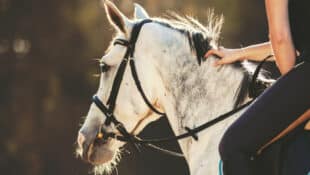What does a pain-free, content horse really look like? Ongoing research aims to improve our horses’ experiences as partners in sport and life.
Researchers looked at how therapy horses reacted to various types of patting on various body parts, when tied up or loose.
A study of dressage horses found oral lesions caused by the bit in a surprising 45% of horses examined at one competition.
This presentation from the ISES conference looks at indicators of positive/negative equine emotions and how humans and AI can recognize them.
Achieving 'lightness' requires a shift of focus away from controlling the neck and head, and more attention directed to the seat and leg.
A study looked at the cost, suitability, versatility, temperament and work ethic of retired Thoroughbreds in various equestrian disciplines.
A study in Australia looked at exercise habits and self-perceptions of fitness among dressage, eventing, and jumping riders.
A presentation at the ISES conference outlined a free online curriculum to help young horsepeople better understand biosecurity measures.
Domestic horse management contrasts with their natural behavioural needs, but can various distractions help stalled horses be happier?
How effective is it, really? And how ethical? UK researchers looked at hundreds of FEI eventing rounds, and the results are a bit surprising.










